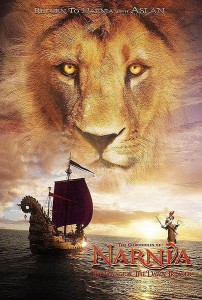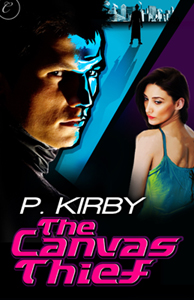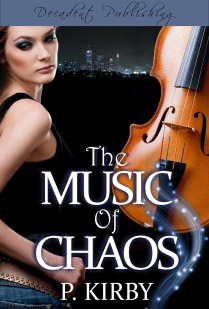“After that, I need to watch a good movie about ships,” says my husband, popping Pirates of the Caribbean in the DVD player.
That being Chronicles of Narnia, Voyage of the Dawn Treader. Granted, if one were trying to clean one’s palette with a good nautical movie, one would reach for Master and Commander. But Voyage of the Dawn Treader sets the bar so low, Pirates is a masterpiece of seafaring authenticity.
Confession. I’m not a fan of the Narnia series. I know—gasp!–fantasy writer heresy. It would seem that every fantasy writer lists the Narnia stories as the beloved childhood tales that shaped them into the writer they are today. If by “shaped,” you mean “don’t write boring-ass allegories,” then yeah, I too was shaped.
The only book I’ve read in the series is The Lion, The Witch and the Wardrobe. I enjoyed some aspects of the book–the fauns, minotaurs and whatnot–but I loathed the talking animals.* Especially Aslan. At the time, I had no idea the stories were actually biblical allegory. (My dislike of the maned one apparently predicted my godless future.) At any rate, my reaction to Aslan’s death was a bored shrug. The reader is supposed to love him because he is noble, because he roars and shakes his beautiful mane like a leonine Fabio. The reader is really supposed to love him because he is Jesus, but honestly? I think the character does Jesus a disservice. I mean Jesus was a busy guy: he preached forgiveness and love, healed the sick, raised the dead, and harassed the money lenders. Aslan’s primary role is to opine the growing evil upon the land, let the world go to hell, then show up in the nick of time, saving the day and taking all the credit.
The problem with The Dawn Treader isn’t its religious undertones. The issue is that it takes the source material and strips it like a hungry family on a Christmas turkey. It starts off with the remaining siblings, Edmund and Lucy, and their obnoxious cousin Eustice, getting sucked into a painting and ending up on the titular Dawn Treader, a ship. There they rejoin prince–now king–Caspian. (Ben Barnes‘s Caspian being the prettiest thing in the movie.) Reepicheep the talking mouse/rat thing is also back.
Since every outing must feature an unbeliever, we get kvetching Eustice, who sounds like an old man trapped in a boy’s body. (Too his credit, it’s a pretty good performance.) Eustice’s personality is greatly improved when he is turned into a dragon. (He is, however, unhappy about his transformation, which makes no sense. What kid wouldn’t want to be a dragon? Heck, I’d love to be a dragon.)
The Dawn Treader is a pretty ship. It looks like it just rolled out of the dragon ship showroom. Not a hint of wear on the paint. Nary a barnacle to be seen. And the crew, a mixture of humans and minotaurs, are oddly idle, begging the question, “Who keeps the deck so nicely swabbed?”
The Dawn Treader voyages to an island. They send in a landing party consisting of Caspian, Lucy, Edmund and Eustice. What kind of country sends its rulers anywhere without an entourage? The island appears to be deserted. Soon after, our royal nitwits learn why, as they are captured by slavers. While locked up they see a group of slaves sent out to sea in a little boat, where they are eaten by a green mist. The green mist is…drumroll…the villain. That’s right, the antagonist is a noxious fume.
Anyway, the ship’s crew eventually realizes that their leaders are in trouble and comes to the rescue. There’s more journeying aboard the impossibly clean ship, and then kids learn that they must find seven magic swords, which, when united, will form Voltron, Defender of the Universe. Yeah, if only. Instead, the reunion of the seven swords makes a really bright light which, like a glowy emancipation proclamation, frees the slaves from the big green fart villain. That’s it. The plot.
The story ends with Aslan’s arrival–himself having done nothing this time but babble about belief–and Reepcheep’s symbolic suicide. Yeah, it’s supposed to symbolize Reepcheep’s acceptance of Jesus as his Savior, but the fact is, the rat opts to leave the world of Narnia–permanently.
Given the declining quality of these movies, who can blame him?
*Not that I was an animal hater. But my favorite fictional animals were those in Watership Down, White Fang, and Call of the Wild. Stories featuring animals who didn’t dress up in human clothes and wield swords.



